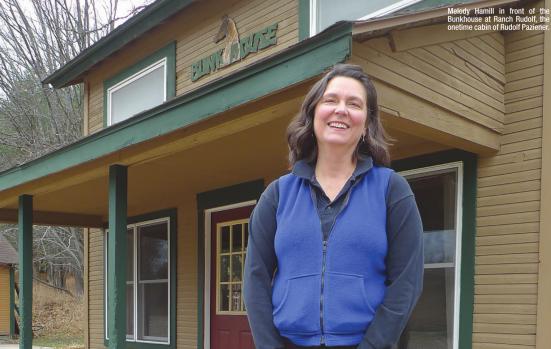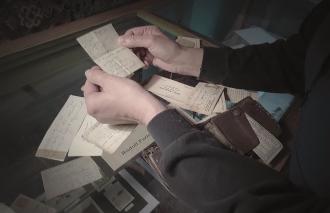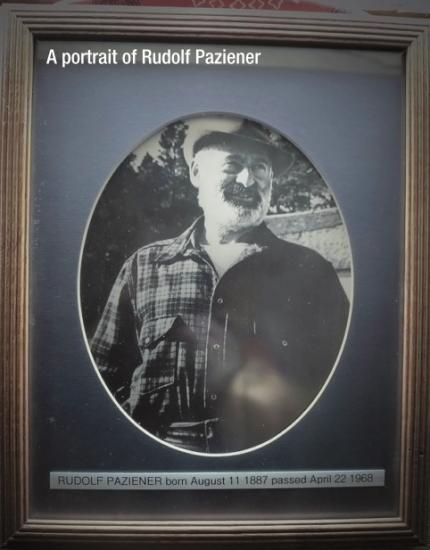Glimpse Into the Past
 A Resort Meant To Preserve History Has A History of Its Own
A Resort Meant To Preserve History Has A History of Its Own When Rudolf Paziener arrived in the Boardman River Valley in 1922, it was known as "plains country" because loggers has stripped the land of trees as far as you could see. The strange beauty of the rugged land found a foothold in Paziener’s heart and he would spend the next five decades hunting, fishing, cooking, caring for horses and hosting guests at a ranch that would carry his name long after he was gone.
Paziener might have been the first farmto-table gourmet chef to work in northern Michigan, hosting businessmen from Chicago on hunting and fishing expeditions and preparing their food with expertise he learned in the Old World.
The owners of today’s Ranch Rudolf – marking its 50th anniversary as a modern day resort in 2016 – work to continue Paziener’s tradition, maintaining a property that offers a connection to wilderness and a glimpse into the past.
PART I: RUDOLF ARRIVES

Austrian immigrant Paziener is a somewhat mysterious character, one whose legend sounds a lot like a fish story or a tall hunting tale. Here’s how it goes.
Paziener served in the Prussian army as chef for Emperor Franz Joseph; he was held a prisoner of war during World War I; and he moved to Chicago in 1916, where he became executive chef at one of the city’s largest hotels. Somehow, he was lured to northern Michigan to work in a cabin in the middle of nowhere.
In the early days, Rudolf ’s ranch consisted of his cabin – still there and now called the Bunkhouse – and two cottages where he hosted guests who paid $150 a week for Paziener to guide them on hunting and fishing trips and cook their food.
"With Rudolf ’s fabulous cooking, the ranch quickly became a renowned haven for hunters and fishermen seeking excellent food and lodging in a natural setting," according to a history of Paziener’s days written by Paul Garvey, an Australian journalist who worked at the ranch as an exchange student in the 1990s.
"His reputation for dry wit and tall tales meant he was soon established as a man worth visiting while passing by on trips down the dusty dirt roads of the Boardman Valley." Garvey wrote.
"When he first came to our area, he came from Chicago and he did not speak English very well," said Edna Sargent, a local historian whose family knew Paziener. "My grandmother studied German in college and took Rudolf under her wings."
Sargent said Paziener was a paradox; he looked like an eccentric who lived in the woods, but he also loved to sing opera and was a master chef. He was known as an animal lover. He called himself the "mayor" of the Boardman Valley and was said to have performed weddings and baptisms. He lived on the property until the mid-1960s and he died in a Traverse City nursing home in 1968 at the age of 80.
"He was a fabulous cook, and that’s why a lot of the fishermen would come," said Jackie Morse, a Traverse City resident who grew up in the Boardman Valley near Paziener. "He just used to wander those woods. I remember him all the time winding up at our place. He was just a cool guy."
PART II: THE MONTGOMERYS BUILD A RESORT

In the 1960s, the land caught the eyes of Harvey and Joanne Montgomery. Harvey Montgomery was a Traverse City pool builder who wanted a place to board the five horses his family had come to love.
It’s unclear how the Montgomerys came to purchase the property. Paziener was the caretaker for a realty company in the early years until that company went out of business; he stayed on as caretaker through the 1950s and was understood to have purchased the property at some point. The history of who owned Ranch Rudolf in those early years is murky, said current owner Melody Hamill.
The Montgomery family didn’t leave the place untouched once they took over. They believed it could be a much larger resort than what Paziener had envisioned. They built a wooden lodge, which at the time was said to be the fifth largest all-wood structure in the country. They constructed two 25-foot-deep trout ponds, built eight small motel rooms and an in-ground swimming pool, plus added stables.
"Mr. Montgomery had this vision: This would be a great place to have an outdoor recreational resort," Hamill said. "When he bought it, they didn’t have electricity, the road didn’t go through. So he paid to have all of that done."
By the time Montgomery was done in 1966, the resort looked like an old-fashioned Wild West town where a stagecoach might roll through at any time. Hamill believes Paziener did not like these changes.
An artist from Chicago had come up with the name Ranch Rudolf in the 1930s and, when the Montgomerys took over and planned to re-christen the new resort, Paziener would not have it.
"They were going to name the property the Roving M Motor Lodge and Rudolf – I was told this by the Montgomery children – they said, "˜Its name is Ranch Rudolf and it will remain,’" Hamill said, laughing, "in a very stern, direct, authoritative voice, like, "˜Oh, we better not change this. Something might happen.’"
PART III: ENTER THE PARK PLACE
Hamill knows so much about the Montgomerys because the children contacted her in the late "˜90s wanting to hold a family reunion at Ranch Rudolf.
"When the Mongomerys built this, the kids were young – Harvey Jr. was 12 and Nora was 9 – and then we got a call when the kids were 51 and 54," Hamill said. "We got a call from the son and he said that their mom and dad had both passed away and they wanted to have a reunion and come back to the area and look at it – have a memorial for them."
The Montgomerys may have built what Ranch Rudolf is today, but in the scheme of things, they didn’t stick around that long. Nines years after they arrived, they moved to Florida. Hamill said she suspects financial difficulties forced the family to sell, but they quickly found a willing buyer.
Ted Okerstrom, founder of the Vasa cross-country ski race and then-manager of the Park Place Hotel, loved winter sports and coveted Ranch Rudolf.
"Ted loved Ranch Rudolf and he brought sled dogs here and they did skijoring, so you would be on skis and the dog would be pulling you, and they gave dog sled rides and stuff," Hamill said.
The Park Place purchased the property and modernized it a bit. They restored Paziener’s former home across the dirt street from the lodge, making it what’s now known as the Bunkhouse; they turned the stables into the Strawdog Room and the General Store; they added a campground and doubled the number of motel rooms.
The hotel operated the ranch for several years and offered its guests in Traverse City access to horseback riding and cross-country skiing. When the hotel changed ownership in the early 1980s, Ranch Rudolf was again for sale and the Hamills found their future.
PART IV: THE HAMILLS COME HOME
Melody Hamill and her husband, Sid, both grew up downstate around horses. Though running a ranch was not what the couple planned to do when they moved to Traverse City after college, fate intervened.
In 1981, Sid Hamill worked at a manufacturing company, but wanted to do something else. Melody Hamill worked at a bank and was home on maternity leave.
"Our daughter was born in October and, this is Dec. 1st, Sid comes home in the middle of the day and I’m like, "˜What are you doing home?’" Hamill recalls. ""˜I just got laid off"¦.’ So I said, "˜Well, I guess you go look for another job,’ and he tells me, "˜I don’t like doing what I’m doing, being in a cubical and being in an office and on the phone.’" Melody soon went back to work and her husband stayed home to look for something else to do. The couple was familiar with Ranch Rudolf because of their love of horses, but when they learned it was for sale, they were reluctant to get into the hospitality business.
"That was a very new business to us. Sid had the knowledge of a riding stable. I had the love of horses and, baby in arm, we approached [the Park Place] on just buying that side of the road where the stable is," she said. "And they did not want to break it up, and so we ended up making an offer. So, here we are, 30-some years later."
Today, the 230-acre resort is run as a "guest ranch" in the summer, where people can stay, eat, ride horses and take part in other outdoor activities. They also offer camps for kids to learn to ride horses and they host private parties.
In the winter, the restaurant opens to the public and the resort is a hub of cross-country skiing and snowmobiling.
CONNECTED BY A LOVE OF HORSES
On the drive from Traverse City to Ranch Rudolf, the closer you get, the more it feels you are somewhere outside of time. While other places have grown and changed and developed, it has stayed the same.
That feeling of rustic wilderness owes a lot to the surrounding Pere Marquette State Forest and the Brown Bridge Quiet Area, a 1,310-acre nature preserve managed by the Grand Traverse Conservation District.
Much of the work the Hamills put into the place in their 33 years has been with the aim of making it feel as rustic and faraway as it must have been in Paziener’s days.
They’ve had to make some small nods to modernity, but Hamill said those have come with reluctance.
"We do have Wi-Fi. Through the years, we had the TV forever in the lobby and then we went and did the flat screen in the main lodge, but we do not have TVs in our motel rooms," Hamill said. "We’re an outdoor recreational resort. That’s what the guests like about us. You’re coming back in time and you’re somewhat unconnected. You can be connected if you have to be, but you don’t have to be."
The Hamills’ children, a son and daughter, work at the ranch, and both have children of their own.
"Our kids have grown up here," she said.
"They’re both married and they both have children, so we’re on to the third generation, so that’s exciting."
Hamill said what connects all of the individuals who have owned this place – her family, the Montgomerys and Rudolf Paziener – is a love of horses. (Paziener’s horse Bobby is said to have once saved his life by dragging him out of the woods after Paziener struck himself with an axe.)
"I think it’s the love of the horse that brought us all here," Hamill said.
View On Our Website